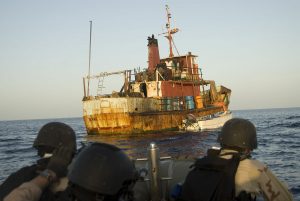
Pirate Ransom Negotiations: Resolving the Paradoxes of Extortionate Transactions with Somali Pirates
William A. Donohue (Michigan State University), Franziska Pugh (Michigan State University), Sharmaake Sabrie (Georgetown University) Somali pirates take a very business-like approach to their craft. “We attack big ships that can pay us. However, after capturing several ships we have learned about what type of ships to target and which ...
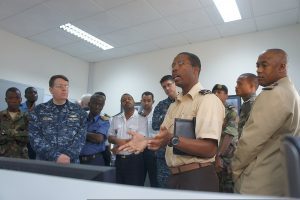
A Two-Way Street: Organizing Intelligence Cooperation for the Maritime Transport Industry
By Hassan M. Eltaher Threats to the maritime industry include threats to ships/vessels, ports, port facilities, passenger terminals, national and international waterways including their locks and approaches; international straits and multinational rivers; navigation facilities; waterside and landside moorings; human and multi-modal vehicular traffic; seaplane operations, and finally threats to Mobile ...

Terror at Sea: Exploring Maritime Targeting by Terrorist Organizations
By Victor Asal and Justin V. Hastings Maritime terrorism is not a prominent research topic. Terrorist attacks against maritime targets are very rare. The Global Terrorism Database (GTD) only notes 199 out of 98,000 attacks in 40 years, which is less than 0.2% of the total. Even rarer are attacks ...
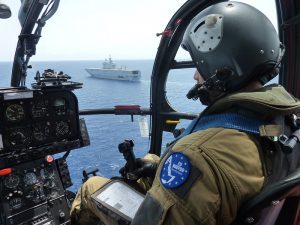
Beyond Rivalry? EU–NATO Cooperation in Counter-Piracy Operations
By Simon J. Smith and Carmen Gebhard Counter-piracy operations and maritime engagement in the Gulf of Aden is a puzzling case for anyone interested in the political and institutional problems underlying the attempts by both the European Union (EU) and the North Atlantic Treaty Organization (NATO) to cooperate in security ...
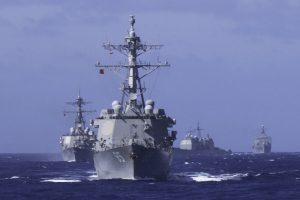
Power at Sea: Insights from a Naval Power Dataset, 1865-2011
Brian Benjamin Crisher and Mark Souva, Florida State University Naval power is a crucial element of state power, yet existing naval datasets are limited to a small number of states and ship types. Here we present 147 years of naval data on all the world’s navies from 1865 to 2011 ...
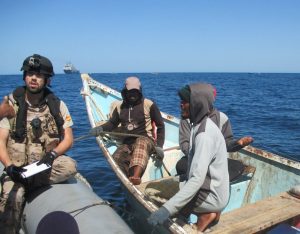
Facts, Figures, Trends: the Contemporary Maritime Piracy Database 2001-2010
By Anamika Twyman-Ghoshal The lack of reliable piracy data has been identified as one of the main obstacles to contemporary maritime piracy research (Worrall, 2000; Ong-Webb, 2007). Research to date has focused on selected types of piracy or on particular geographical regions where piracy occurs, usually relying on single sources ...

Into the Blue: Rethinking Maritime Security
Insights from an ESRC sponsored Ideaslab on Maritime Security at Cardiff University, 26-27 June 2014 By Jan Stockbruegger and Christian Bueger, Cardiff University The concept of maritime security is one of the most recent additions to the vocabulary of international security. If security at sea used to be discussed in ...
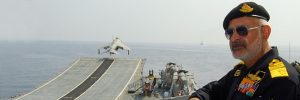
Rising Powers in Maritime Security? Comparing the Strategies of Brazil and India
By Adriana Erthal Abdenur and Danilo Marcondes de Souza Neto In the fluid, highly uncertain context of the post-Cold War period, rising powers have begun to engage more intensely in region-building, redefining their strategic vicinities through a combination of inter-state cooperation and military build-up. Although this topic has been addressed ...
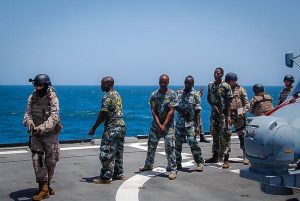
Africa’s Maritime Domain: Can the Regional States Ensure a Stable Regime in the Indian Ocean Region?
by P.V. Rao The unstable and fragile political regimes of many of the African littoral countries in the Indian Ocean Region compound the problems of managing their maritime domains. Maritime criminal and illegal operations are confined not only to the coastal states but also to the island states of the ...

Technological Solutions to the Piracy Problem? Lessons Learned from Counter Piracy off the Horn of Africa
Christian Bueger & Anna Leander Insights from a CRIC Seminar supported by CBS Maritime, Copenhagen Business School, 26 May 2014 The fight against Somali piracy has sparked a range of interesting innovations of how the international community approaches an international problem. This includes new means of international cooperation, such as ...
